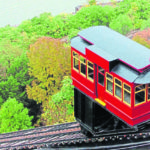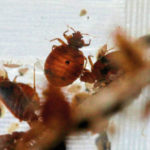Bedbugs are back inside the Duquesne Incline.
Discovery of the pests Wednesday afternoon forced closure of the iconic incline at 3 p.m. so an exterminator could treat the cars and station of the incline, according to a release from the Port Authority of Pittsburgh.
The incline will reopen at 5:30 a.m. Friday after the bedbugs are killed, the release said.
Port Authority will operate a shuttle bus from the upper station on Grandview Avenue to the lower station on West Carson Street.
The Port Authority issued the release on behalf of the The Society for the Preservation of the Duquesne Heights Incline, which operates the 142-year-old funicular.
The closure comes after an exterminator treated the cars for the same problem overnight Monday because a woman was bitten 102 times while taking a ride on it last Friday.
The Steel Valley School District closed its schools Wednesday after bedbugs were found this week in backpacks at the high school and middle school. Clairton City School District also treated an infestation in September.
Battling a bedbug infestation can be expensive and psychologically taxing, said Adam Witt, a Pittsburgh exterminator.
“Bedbugs are a real problem in Pittsburgh,” said Witt, president of Witt Pest Management in the city’s Polish Hill neighborhood. “They have been. They don’t seem to be going away.”
The insects have been a problem since Witt’s great-grandfather started the business in 1908, and they’ve been a big part of it in the 10 years Adam’s been running the place. Witt Pest Management gets about 20 to 30 calls per day from either current or prospective customers about infestations, Witt said.
A bedbug infestation can happen to anyone: rich, poor, clean or dirty, Witt said.
“They’re equal opportunists. It has nothing to do with your sanitation or anything else,” Witt said Wednesday.
Infestations in apartment complexes are especially tough, according to information from the Allegheny County Health Department. Research shows that more than half of the apartments adjacent to a bedbug-infested unit also have bedbugs in them, according to the health department.
Also, half of the people who have an infestation don’t know about it, the health department said.
Bedbugs feed on blood, mainly that of humans, and they can be picked up anywhere large groups of people gather, Witt said.
They can be killed using heat, steam and chemicals, but the key is finding the source, he said.
“It’s all about trying to get to the bottom of how you brought them in,” he said. “They’re resilient, and it really takes a comprehensive approach to eradicate them.”
It can cost between $600 and $800 to more than $1,000 depending on the extent of the infestation, Witt said. Taking care of the problem isn’t covered by most homeowner’s insurance, he said.
And beyond the cost, an infestation can have a psychological toll on the family, Witt said.
“It can sometimes uproot people’s lives. It’s obviously not pleasant to know something’s sucking your blood,” he said.
The pests don’t carry disease, according to the Centers for Disease Control and Prevention, but their bites can cause an allergic reaction that requires medical treatment.
Some people don’t even notice bites, Witt said.
“We can eliminate them; there is hope,” he said.











